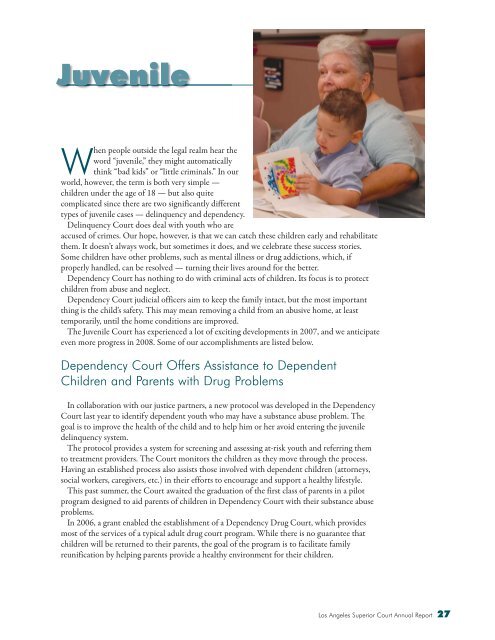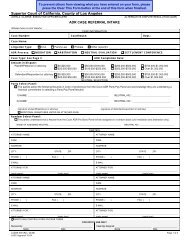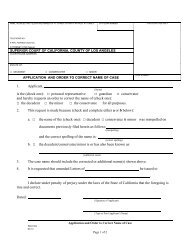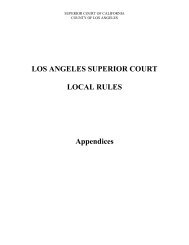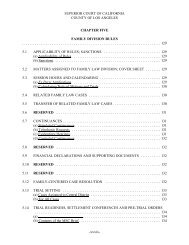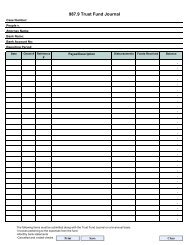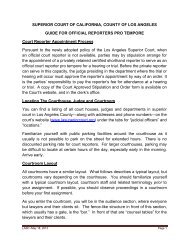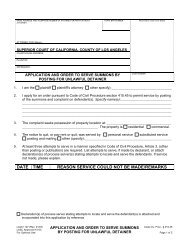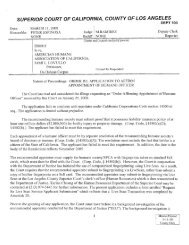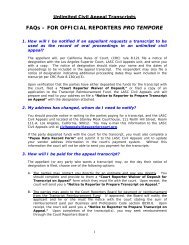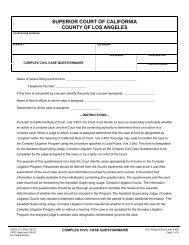2008 Annual Report - Superior Court of California - County of Los ...
2008 Annual Report - Superior Court of California - County of Los ...
2008 Annual Report - Superior Court of California - County of Los ...
Create successful ePaper yourself
Turn your PDF publications into a flip-book with our unique Google optimized e-Paper software.
Juvenile<br />
When people outside the legal realm hear the<br />
word “juvenile,” they might automatically<br />
think “bad kids” or “little criminals.” In our<br />
world, however, the term is both very simple —<br />
children under the age <strong>of</strong> 18 — but also quite<br />
complicated since there are two significantly different<br />
types <strong>of</strong> juvenile cases — delinquency and dependency.<br />
Delinquency <strong>Court</strong> does deal with youth who are<br />
accused <strong>of</strong> crimes. Our hope, however, is that we can catch these children early and rehabilitate<br />
them. It doesn’t always work, but sometimes it does, and we celebrate these success stories.<br />
Some children have other problems, such as mental illness or drug addictions, which, if<br />
properly handled, can be resolved — turning their lives around for the better.<br />
Dependency <strong>Court</strong> has nothing to do with criminal acts <strong>of</strong> children. Its focus is to protect<br />
children from abuse and neglect.<br />
Dependency <strong>Court</strong> judicial <strong>of</strong>ficers aim to keep the family intact, but the most important<br />
thing is the child’s safety. This may mean removing a child from an abusive home, at least<br />
temporarily, until the home conditions are improved.<br />
The Juvenile <strong>Court</strong> has experienced a lot <strong>of</strong> exciting developments in 2007, and we anticipate<br />
even more progress in <strong>2008</strong>. Some <strong>of</strong> our accomplishments are listed below.<br />
Dependency <strong>Court</strong> Offers Assistance to Dependent<br />
Children and Parents with Drug Problems<br />
In collaboration with our justice partners, a new protocol was developed in the Dependency<br />
<strong>Court</strong> last year to identify dependent youth who may have a substance abuse problem. The<br />
goal is to improve the health <strong>of</strong> the child and to help him or her avoid entering the juvenile<br />
delinquency system.<br />
The protocol provides a system for screening and assessing at-risk youth and referring them<br />
to treatment providers. The <strong>Court</strong> monitors the children as they move through the process.<br />
Having an established process also assists those involved with dependent children (attorneys,<br />
social workers, caregivers, etc.) in their efforts to encourage and support a healthy lifestyle.<br />
This past summer, the <strong>Court</strong> awaited the graduation <strong>of</strong> the first class <strong>of</strong> parents in a pilot<br />
program designed to aid parents <strong>of</strong> children in Dependency <strong>Court</strong> with their substance abuse<br />
problems.<br />
In 2006, a grant enabled the establishment <strong>of</strong> a Dependency Drug <strong>Court</strong>, which provides<br />
most <strong>of</strong> the services <strong>of</strong> a typical adult drug court program. While there is no guarantee that<br />
children will be returned to their parents, the goal <strong>of</strong> the program is to facilitate family<br />
reunification by helping parents provide a healthy environment for their children.<br />
<strong>Los</strong> Angeles <strong>Superior</strong> <strong>Court</strong> <strong>Annual</strong> <strong>Report</strong> 27


